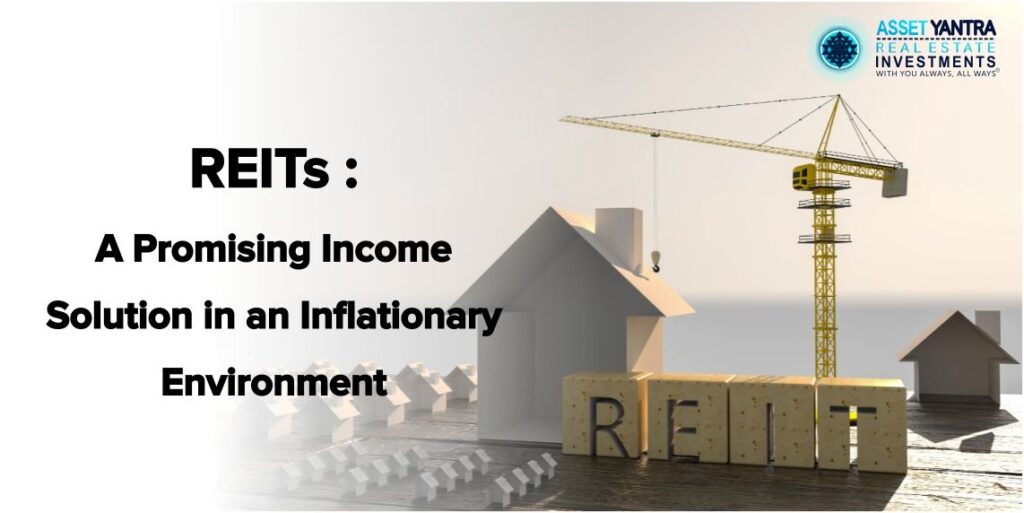Real estate investment trusts (REITs) are a popular investment option for many investors. The number of REITs in India has risen from 12 to more than 250 in the last few years. However, these investments have also been hit by an increasing rate of inflation which has made them less attractive to some investors.
The rate of inflation is picking up pace and it may be a good idea to look at various asset classes. To protect your hard-earned money from the eroding value of the Indian rupee. REITs are one such asset class that has been performing well in recent years with many investors looking for income, diversification, and liquidity.
There are many ways to invest in REITs:
- By buying units directly from its promoter/shareholder;
- By investing in an active fund manager’s portfolio (or any other mutual fund). Or by buying shares of an open-ended fund like mutual fund that invests primarily in real estate companies.
REITs provide an opportunity to build a portfolio of quality real estate assets at a low cost. They are generally easier to invest in than direct real estate investments. And can be used as a long-term investment avenue or even as an income-generating tool. The current scenario is very favorable for REITs as they offer returns on capital invested. Through regular dividend payments, sale proceeds from the property sale. Or through re-investment into new projects/properties which would result in higher yields over time.
The next step would be selecting the right fund manager. Who will guide your investment decisions based on your risk appetite. nd financial goals till retirement age
In an inflationary environment like the one we are currently experiencing. Most of your investments would have lost value because of rising prices. Real estate is different from other asset classes because it can be rented out at a reasonable price. Which means that you can earn good money from renting out your property without having to worry about its price falling as much as other assets do when inflation goes up.
Suggested for you: REITs vs Direct Real Estate: Confused about Where to Invest? Here’s how to find the perfect fit for you
The real estate investment trusts (REITs), in this scenario, can prove to be a boon for such investors.
REITs are a good option for investors looking for a stable and regular income. These entities have been around since 1957, with the first REIT being established by Charles Ellis and Edward O’Neal. Today, there are over 200 REITs in the U.S., with the most focusing on commercial properties (i.e., office buildings)
The optimal solutions to the income problem in a rising interest rate environment
REITs have been a popular choice for investors who want to diversify their portfolios. But also want some level of stability in their investments. They can be considered as an alternative way to generate more income from your existing assets. In addition, they provide liquidity when needed and offer protection inflationary pressure on capital markets (in case there is no dividend payout).
An opportunity to build a portfolio of quality real estate assets at a low cost
REITs are the most popular real estate investment vehicle. And they offer a diversified portfolio of quality real estate assets at a low cost.
REITs allow investors to invest in real estate without the need for large capital expenditure because they purchase shares in a company that owns or manages properties. This means that you can buy shares in important parts of your portfolio, such as office buildings. Without having to purchase an entire building yourself or pay rent on top of what you’re investing to own an asset like this one.
REITs: easier to invest in than direct real estate investments
As with any stock or bond exchange, you can buy and sell shares daily. This means that your investment will always be liquid and available for withdrawal at any time. If a particular property doesn’t have enough cash flow to cover its operating expenses. Then it can be sold off at market value so that other investors don’t lose money when they purchase it from the seller.
Additionally, REITs are also listed on stock exchanges, so unlike private companies that don’t trade publicly (or only do so irregularly). There is no risk of losing money if an investor doesn’t know about an upcoming sale or dividend payment. Because everyone has access to all information about those events through their brokerages websites!
How do REITs compare to other Investment Options?

One of the biggest advantages of REITs is that they offer better liquidity than direct real estate investments. If you buy into a REIT and decide to sell your shares. They will be available at any time without going through a lengthy process of selling off shares at below – market prices. This makes them an excellent way for investors who want immediate access to their investment portfolio or those with specific needs like financing needs or cash flow needs.
REITs are also a good way for investors who want diversification in their portfolios but don’t want all their assets tied up in one type of asset (such as real estate). You can get exposure by owning multiple types of assets within one fund. Like stocks, bonds, commodities, and more and then reap the rewards when prices go up over time because each type has different risks attached.”
Conclusion
In this article, we have covered the basics of REITs and how they are different from other instruments like stocks, fixed income, and gold. We hope that you found this information useful and decided to learn more about REITs.
To invest in a wide range of lucrative real estate assets, choose Asset Yantra & Gak Group.

